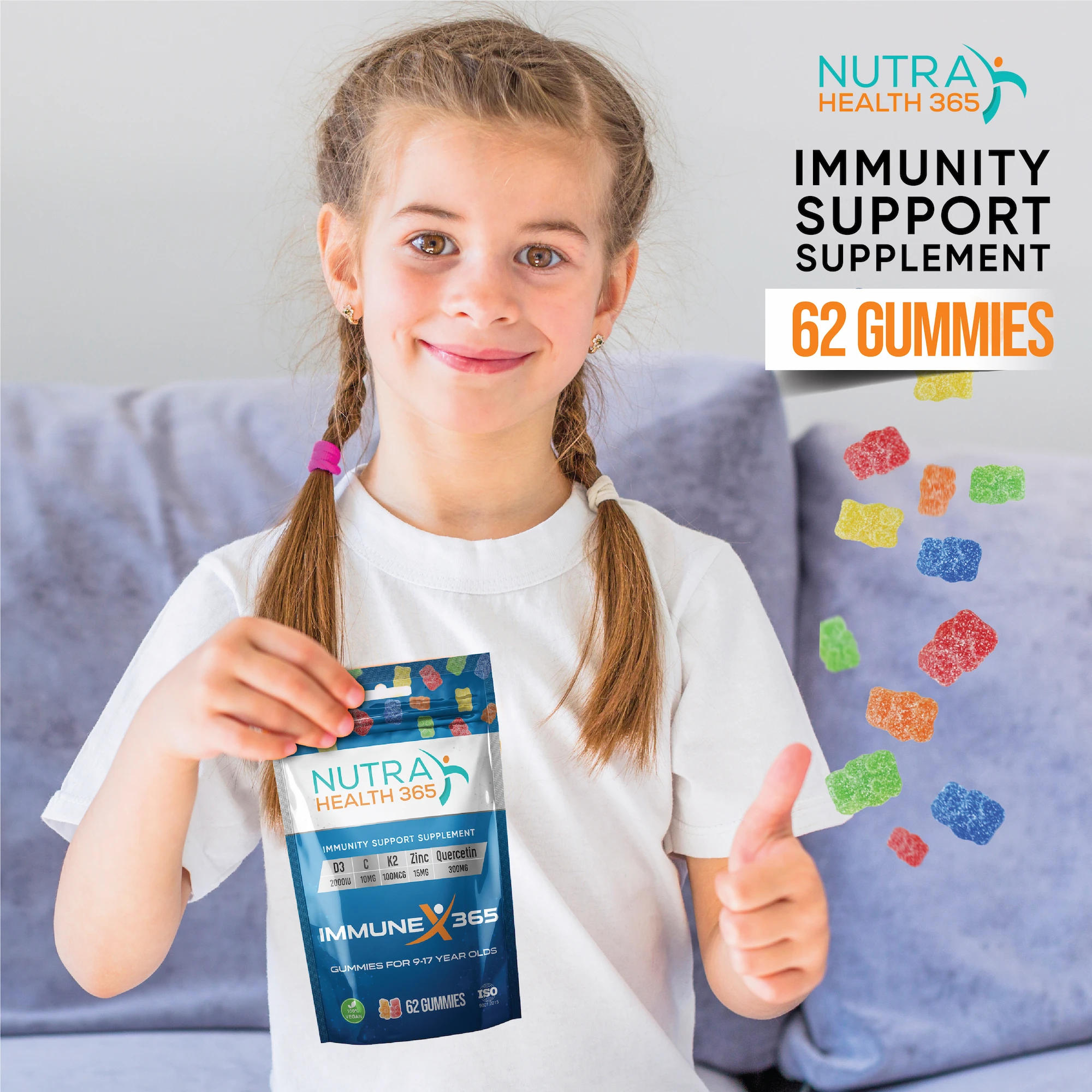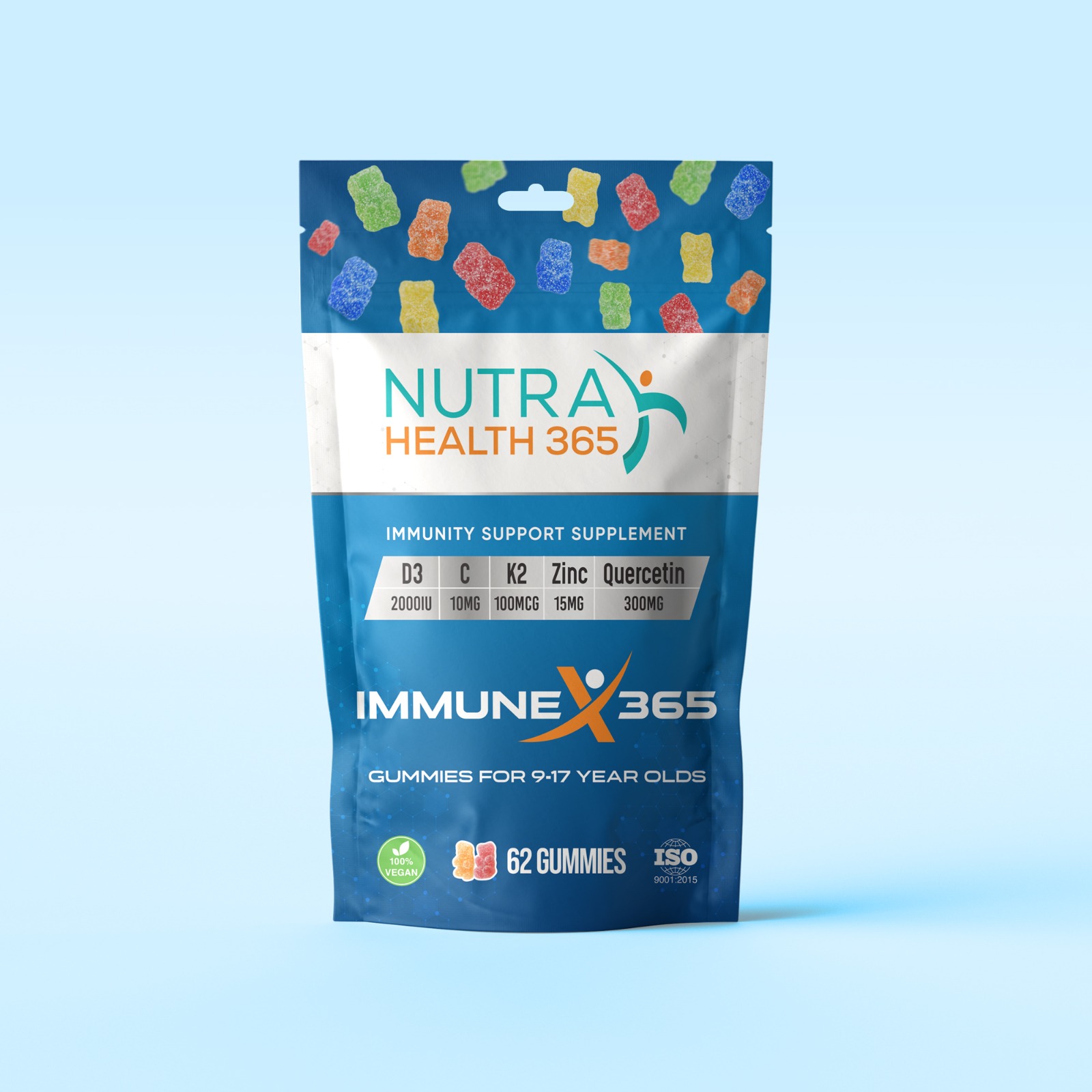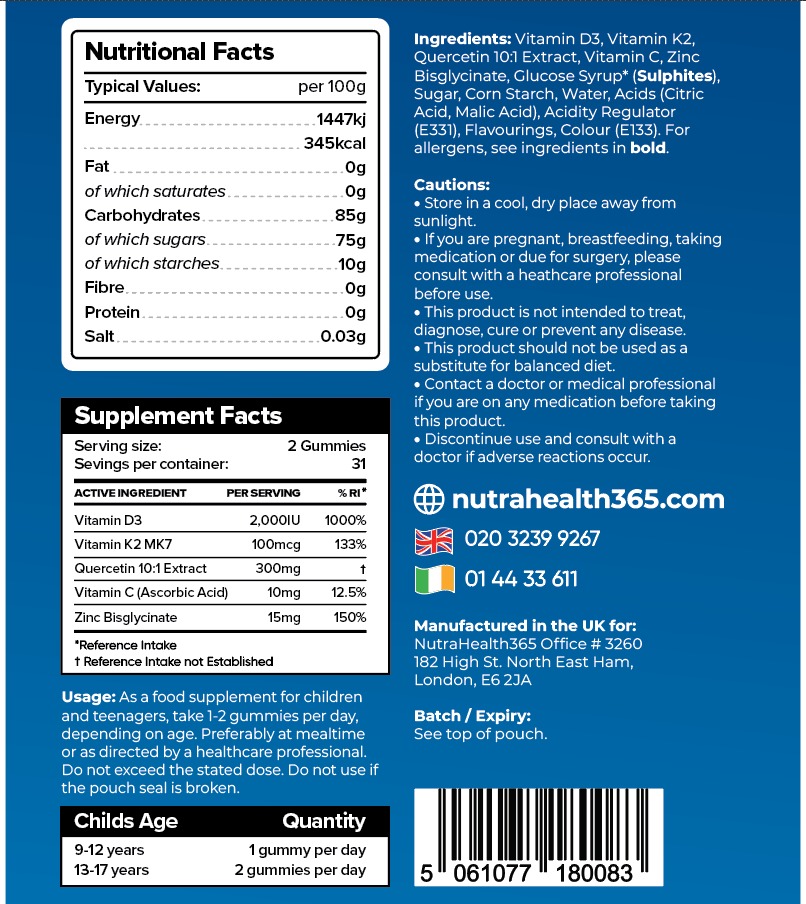Immunity Booster
Immunex365 for Young Adults
A robust immune system defends against infections, promotes healing, and maintains overall health, crucial for vitality and resilience against illnesses.
Immunex365 for young adults (9 to 17 years old), contains the same powerful ingredients as our adult version but at lower levels to align with daily recommended intakes.. This product helps strengthen natural immunity, providing year-round support to keep you healthy and energized, promoting overall wellness and protection throughout the year.
DIETARY SUPPLEMENT WITH 5 ESSENTIAL NUTRIENTS:
Vitamin D3 – 2,000 IU
Vitamin K2 MK7 – 100 mcg
Quercetin – 30mg (10:1 extract)
Vitamin C – 30 mg
Zinc Biglycinate – 15 mg
In stock
What Our Customers Say
Our simple order process
Step 1
Step 2
Step 3
Great Value Cart Discounts
Buy More, Save more
Buy 1 Product
Full price plus £4.99 shipping
Buy any 2 Products
10% off plus FREE SHIPPING
Most Popular
Buy any 3 Products or more
20% off plus FREE SHIPPING
Buy any 6 Products or more
Best Value
30% off plus FREE SHIPPING
The Importance of Vitamin D3 for Young Adults Aged 9 to 17
Vitamin D3 is a vitamin that plays a vital role in numerous physiological processes, especially during the critical developmental years of adolescence. Young adults aged 9 to 17 experience significant physical, emotional, and cognitive changes. Adequate levels of vitamin D3 are essential to support these changes, promoting not just bone health but also immune function, mood regulation, muscle strength, and long-term health outcomes.
Immune Function
Modulation of Immune Response
Vitamin D3 plays a pivotal role in modulating the immune system. It enhances the pathogen-fighting effects of monocytes and macrophages—white blood cells essential for immune defense. Adolescents are often exposed to various pathogens, particularly in school environments.
- Reduced Infection Risk: Adequate vitamin D levels are associated with a lower incidence of respiratory infections, which is crucial for young adults balancing school, sports, and social activities.

Bone Health
Role in Calcium Absorption
Vitamin D3 is crucial for the absorption of calcium in the intestines, which is vital for developing strong and healthy bones. During adolescence, individuals experience peak bone mass accumulation, making it imperative to have sufficient vitamin D to ensure proper bone mineralization.
- Bone Density and Growth: Studies have shown that higher vitamin D levels correlate with greater bone mineral density. Insufficient vitamin D during these years can lead to decreased bone density, increasing the risk of fractures and conditions like osteoporosis in later life.
Risk of Deficiency
The prevalence of vitamin D deficiency is notably high among adolescents, particularly those with limited sun exposure or dietary intake. This deficiency can hinder growth and increase the risk of rickets in younger individuals.

Mood Regulation and Mental Health
Impact on Mental Well-Being
Emerging research suggests a significant relationship between vitamin D levels and mental health. Adolescence is a period of heightened emotional development, and adequate vitamin D may contribute to better mood regulation.
- Depression and Anxiety: Studies have indicated that low vitamin D levels are linked to an increased risk of depression and anxiety. Ensuring sufficient vitamin D during this time may mitigate these risks and support emotional health.
Neurodevelopment
Vitamin D receptors are present in brain tissues, suggesting that vitamin D may have a role in brain development and function. Adequate levels during adolescence may support cognitive functions, including memory and learning.

Muscle Function
Strength and Physical Performance
Vitamin D3 is essential for muscle function and has been linked to improved muscle strength and physical performance. This is particularly beneficial for adolescents involved in sports and physical activities.
- Muscle Recovery: Adequate vitamin D levels can enhance muscle recovery, helping young athletes maintain their performance and reduce injury risk.

Long-Term Health Benefits
Chronic Disease Prevention
Maintaining adequate vitamin D3 levels during adolescence can have lasting effects on health. Research suggests that individuals with sufficient vitamin D are at a lower risk of developing chronic diseases, including cardiovascular diseases, diabetes, and certain cancers.

Sources of Vitamin D3
Sunlight Exposure
The body naturally produces vitamin D3 when the skin is exposed to sunlight. Recommendations suggest that 10-30 minutes of sun exposure several times a week can help maintain adequate levels. However, factors such as skin type, geographic location, and season can significantly affect vitamin D synthesis.
Dietary Sources
Dietary intake of vitamin D3 is also essential. Foods rich in vitamin D include:
- Fatty Fish: Salmon, mackerel, and sardines
- Fortified Foods: Milk, orange juice, and cereals
- Egg Yolks: A natural source of vitamin D
Supplements
For adolescents who may not receive enough vitamin D from sunlight and diet, supplements can be an effective way to ensure adequate intake. The appropriate dosage should be discussed with a healthcare provider.

The Supporting Cast
Vitamin K2 works synergetically with Vitamin D to help direct the calcium around the body to where it needs to be.
Zinc is found in cells throughout the body. It enables the immune system to fight off invading bacteria and viruses.
Quercetin is a plant extract that can help your body reduce inflammation and to improve your immune system’s health. Quercetin facilitates the transfer of zinc into cells through channels known as ionophores.

The Science
Frequently Asked Questions
When should I take my Immunex365 gummies?
Ideally you should take your ImmuneX365 gummies after breakfast every day. 9-12 year old’s should take one gummy every day. 13-17 year old’s should take two gummies every day.
How does Vitamin K2 interact with Vitamin D?
Helping to keep your heart and bones healthy. Vitamin D3 and Vitamin K2 ensure that calcium is absorbed easily and reaches the bone mass while preventing arterial calcification. Separately, K2 regulates normal blood clotting, whilst D3 supports a healthy immune system and muscle function.
Why is Vitamin D called the “Sunshine Vitamin”?
The main reason Vitamin D is nicknamed the ‘Sunshine Vitamin’ is because of our body’s ability to produce Vitamin D when exposed to direct UV sunlight. This means that those who find it challenging to get enough exposure to regular sunlight can also experience difficulties enjoying the health benefits of Vitamin D.
Why is Zinc so crucial to your immune system?
There are several ways Zinc boosts the immune system but primarily activates enzymes that break down proteins in viruses and bacteria, so they are less able to spread. Zinc also increases the activation of cells responsible for fighting infection.
Why does ImmuneX365 contain Quercetin?
Quercetin is a plant flavonol from the flavonoid group of polyphenols. It is found in many fruits, vegetables, leaves, seeds, and grains; capers, red onions, and kale are common foods containing appreciable amounts of it. Quercetin has antioxidant and anti-inflammatory effects that might help reduce swelling, kill cancer cells, control blood sugar, and help prevent heart disease. Quercetin is most commonly used for heart and blood vessel conditions and to prevent cancer.


